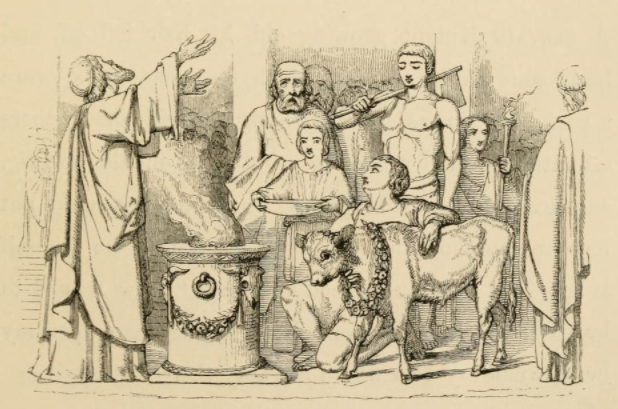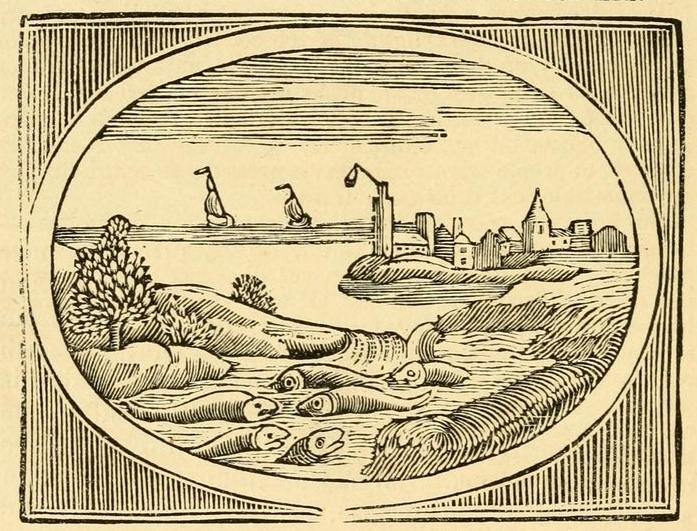A Lapwing Preferr'd.
Upon a General Invitation to the Eagle's Wedding, there were several Birds of Quality among the Rest, that took it in Heavy Dudgeon to see a Lapwing Plac'd at the Upper End of the Table. 'Tis true, they cry'd, he has a kind of a Coxcomb upon the Crown of him, and a Few Tawdry Feathers; but Alas, he never Eat a Good Meals Meat in his Life, till he came to This Preferment.
'Tis a Scandal to a Government, and there goes Envy along with it, where Honours are Conferr'd upon Men for Address, Beauty, and External Advantages, rather then for their Good Qualities and Virtues.
A Hunts-man and a Currier.
A Currier bought a Bear-Skin of a Hunts-man, and laid him down ready Money for't. The Hunts-man told him that he would kill a Bear next day and he should have the Skin. The Currier, for his Curiosity, went out with the Hunts-man to the Chace; and mounted a tree, where he might see the Sport. The Hunts-man advanc'd very bravely up to the Den where the Bear lay, and threw in his Dogs upon him. He Rustled out immediately, and the Man missing his Aim, the Bear overturn'd him. So the Fellow held his Breath, and lay Stone still, as if he were dead. The Bear snuffled, and smelt to him; and took him for a Carcass, and so left him. When the Bear was gone, and the Danger over, down comes the Currier from the Tree, and bad the Hunts-Man Rise. Heark ye, my Friend, says the Currier, the Bear whisper'd somewhat in your Ear. What was it, I prithee? Oh (says the Hunts-Man) he bad me have a care for the future, so make sure of the Bear, before I sell his Skin.
Let no Man undertake for more than he is able to make good.
An Oxe and a Heifer.
A Wanton Heifer that had little else to do than to frisk up and down in a Meadow, at Ease and Pleasure, came up to a working Oxe with a Thousand Reproaches in her Mouth; bless me, says the Heifer, what a Difference there is betwixt your Coat and Condition, and mine! Why, what a gall'd nasty Neck have we here! Look ye, mine's as clean as a Penny, and smooth as Silk I warrant ye. 'Tis a lavish Life to be yoak'd thus,and in perpetual Labour. What would you give to be as free and easy now as I am? The Oxe kept these Things in his Thoughts, without one Word in Answer at present; but seeing the Heifer taken up a while after for a Sacrifice: Well Sister, sayshe, and have you not frisked fair now, when the Ease and Liberty you valu'd your self upon, has brought you to this End?
'Tis no new Thing for Men of Liberty and Pleasure, to make sport with the Plain, Honest Servants of their Prince and Country. But mark the End on't, and while the one labours in his Duty with a good Conscience, the other, like a Beast, but Fatting up for the Shambles.

A Hermit and a Soldier.
There was a Holy Man, that took a Soldier to task, upon the Subject of his Profession, and laid before him the Hazard, the Sins, and the Troubles that attend People of that Trade: Wherefore, says he, for your Soul's Sake, Sir, pray give it over. Well! Father, says the Soldier, I'll do as you bid me; for really we are so ill paid, and there's so little to be gotten by Pillage, that I fancy I had e'en as good betake myself to a godly Life.
When People can live no longer by their Sins, 'tis high time for them to mend their Manners.
A River and a Fountain.
There happen'd a Dispute betwixt a River and a Fountain, which of the Two should have the Preference. The River valu'd it self upon the Plenty and Variety of Fish that it produc'd; the Advantages of Navigation; the many Brave Towns and Palaces that were built upon the Banks of it, purely for the Pleasure of the Situation. And then for the General Satisfaction, in fine, that it yielded to Mankind, in the Matter both of Convenience and Delight: Whereas (says the River) the Fountain passes obscurely through the Caverns of the Earth; lies bury'd up in Moss, and comes creeping into the World, as if it were asham'd to shew the Head. The Fountain took the Insolence and the Vanity of This Reproche so Heinously, that it presently Choak'd up the Spring, and Stopt the Course of its Waters: Insomuch that the Channel was immediately dry'd up, and the Fish left Dead and Stinking in the Mud; as a Just Judgment upon the Stream for Derogating from the Original and Author of All the Blessings it Enjoy'd.
He that Arrogates any Good to Himself, detracts from the Author of all the Good he Enjoys.


